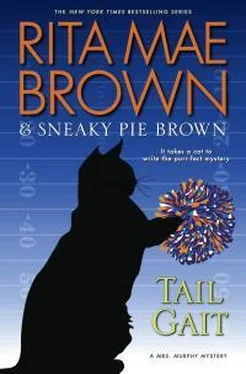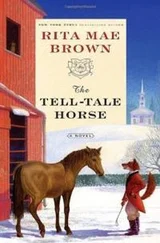“He was,” Olivia quietly affirmed.
“Oh, sorry, Sandy,” said Harry. “This is Olivia Gaston, Ginger McConnell’s daughter. She lives in New Orleans with a brilliantly industrious husband.”
“Your father was a wonderful man, and a good customer,” said Sandy. “Please accept my sympathies.”
“Thank you.” Flustered, Olivia glanced from Sandy to Harry to Susan, then down to the corgis. “This is all my fault.”
“You are not responsible for a drunk,” Susan firmly told her.
“He screamed he’d recognize me anywhere, which after forty years amazes me.” She turned to Sandy. “I was wildly in love with him when I was eighteen, and Daddy broke it up. I haven’t seen him since.”
“Your father was a wise man.” Sandy took a deep breath. “Those poor devils have killed so many of their brain cells, even if they could once think rationally, they’ve forgotten how. But—he recognized you. How extraordinary.”
“Olivia hasn’t aged much.” Susan smiled.
“Susan, that’s a fib.” Olivia was calming down. “I’ve changed, my hair color hasn’t.” She half laughed.
“Any good books on dogs?” Tucker inquired.
Sandy reached under his desk, twirling two pungent treats, which he tossed to the dogs.
“Better than a book.” Owen swallowed.
“We’ll get out of your hair, Sandy,” Susan apologized. “But we knew we’d be safe here.”
“Thank you. If you need anything, let me know. More books coming in every day.” He smiled, then turned to Olivia. “Your father would call once a week to ask if I had found anything from 1775 to 1820. Occasionally I come upon valuable old books, or I hear of a family Bible that’s turned up. He was diligent. He wanted old maps, old anything. He’d go down to Richmond, up to D.C., to Atlanta. I remember, one time, he drove to Guilford, North Carolina, as some wonderful old Revolutionary War maps turned up. Big battle there, you know.”
“I know. We lost that one.” Olivia smiled. “Daddy would talk about that time as though remembering old friends.”
“I guess to him they were,” Sandy said kindly. “We owe who and what we are to those who came before. Now, please, let me help you with anything, anything at all.”
—
As the group left, they walked toward the parking lot, where Olivia had also parked. Her car—well, her mother’s car—was on the second level, so they entered the stairwell. It was always dark, a source of complaint, but Olivia was glad because she burst into tears.
“I am so stupid.”
At the second-floor landing, Susan put her arms around the slender woman. “You’ve had a terrible shock and you’ve lost one of the mainstays of your life. A girl only gets one father.”
“I don’t know what possessed me. I…” The group entered the garage’s second level.
Harry, ever logical, said, “We shouldn’t have told you where Frank lives, so to speak. Curiosity would drive any of us to take a peek.”
“Forty years. Why would I want to look at him? I guess I couldn’t believe he’d fallen so low.” She wiped away the tears with a handkerchief supplied by Susan, always ready for flat tires, tears, headaches, anything and everything.
“Everything is a jumble when someone you love dies.” Harry knelt down to pet Tucker and then Owen. “At least it was for me when Mom and Dad died.”
Olivia stood up straighter. “Here I was acting as though I’m the only person to ever lose a father, and I had mine so much longer than you had yours, Harry. I don’t know what’s wrong with me.”
Susan said, “Nothing is wrong with you. It’s just right now, and for the next few months, it’s best not to make major decisions.”
When Olivia looked puzzled, Harry succinctly said, “Diminished judgment.”
“Yes.” Olivia walked to her car. She pushed the unlock button on her key ring but didn’t open the car door. “I can’t sleep. I keep turning over in my mind who would want to harm my father, the kindest of men. I even rummaged through his desk at home, the file cabinets, looked through his checkbook. I was sure I’d find a clue, but no. His piles of research were, as they always were, neat stacks all over his desk and some on the floor.”
“Did he use a computer?” Harry wondered.
“Daddy? He did. He was slow. Of course he had all those research assistants at UVA. All he had to do was tell them to look up something, or send a message to a colleague who used email. Dad was hands-on. Even if one of his ‘kids,’ as he called them, handed him research papers, if he could, he’d drive to examine the original sources. He was fanatical about that.”
Although seeing that Olivia was more composed, Susan suggested, just in case, “How about if I drive you home? Harry can follow. Good plan, I think.”
Olivia hesitated for a moment. “Yes. Yes, I think it is.” She scanned both of their faces. “Please don’t say anything to Mother or Rennie. No reason to upset them over my mistake. My curiosity got the better of me.”
“Of course not.” Susan took the keys from Olivia’s hand and slid behind the wheel as Olivia walked to the passenger door.
Five minutes later and two levels up, Harry opened the truck door. A little creak reminded her: Time for more grease. She lifted the dogs onto the bench seat, swung herself up, and then followed Susan and Olivia home.
“I wonder if Frank is even strong enough to kill someone,” she mused aloud.
“Best not to find out,” warned Tucker, still angry at the man.

December 25, 1779
Snow squalls swirled through the camp, promising heavier snows soon. From each barracks, a tendril of smoke attempted to escape from the log fireplaces—only to be flattened by the low pressure. Brick would have been far better for the fireplaces, but logs, charred, cost nothing. Central Virginia’s red clay made excellent bricks, but brick, practical and beautiful as it was, proved expensive. An all-brick home shouted Money! Many lovely clapboard homes splurged on brick fireplaces. However, not the primitive log barracks now housing the British prisoners. And worse, from time to time, a downdraft pushed the smoke back into the rectangular interiors.
Sergeant Edward Thimble’s thatching of the roof helped keep in the warmth. When the needles died on the cross-laid firs, and the rain, sleet, and snow filtered inside, accentuating the gloom, the sergeant was suddenly much in demand to thatch other barracks. The commandant of the prison camp secured extra funds from the colony’s legislature for straw. His appeal was met with grumblings from the governor of Virginia about how wickedly the colonists who were imprisoned by the British were being treated. Many rebel prisoners were held in the holds of ships anchored in the harbors of coastal cities occupied by the British. And for helping the Continental soldiers, many civilians were also suffering in miserable conditions. The accepted rules on the treatment of prisoners of war were ignored by the British, although the standards were known throughout the Western world. As far as the Crown was concerned, these rebellious people were criminals at best, traitors at worst. Since they were not recognized as soldiers, they could not be exchanged, and were subject to deplorable conditions. Many died of disease. The terms of surrender at Saratoga had now been emphatically denied by the Crown, creating uncertainty for all.
In contrast, the Continental commanders behaved with decency toward their captives.
General Washington was distressed by the suffering of men he considered patriots, men he considered under his care, but his entreaties and letters to Britain’s General Howe and others were ignored. Clearly, the king and his ministers meant to teach the upstarts a painful lesson. And so they did. They also hardened the colonists’ resolve.
Читать дальше













